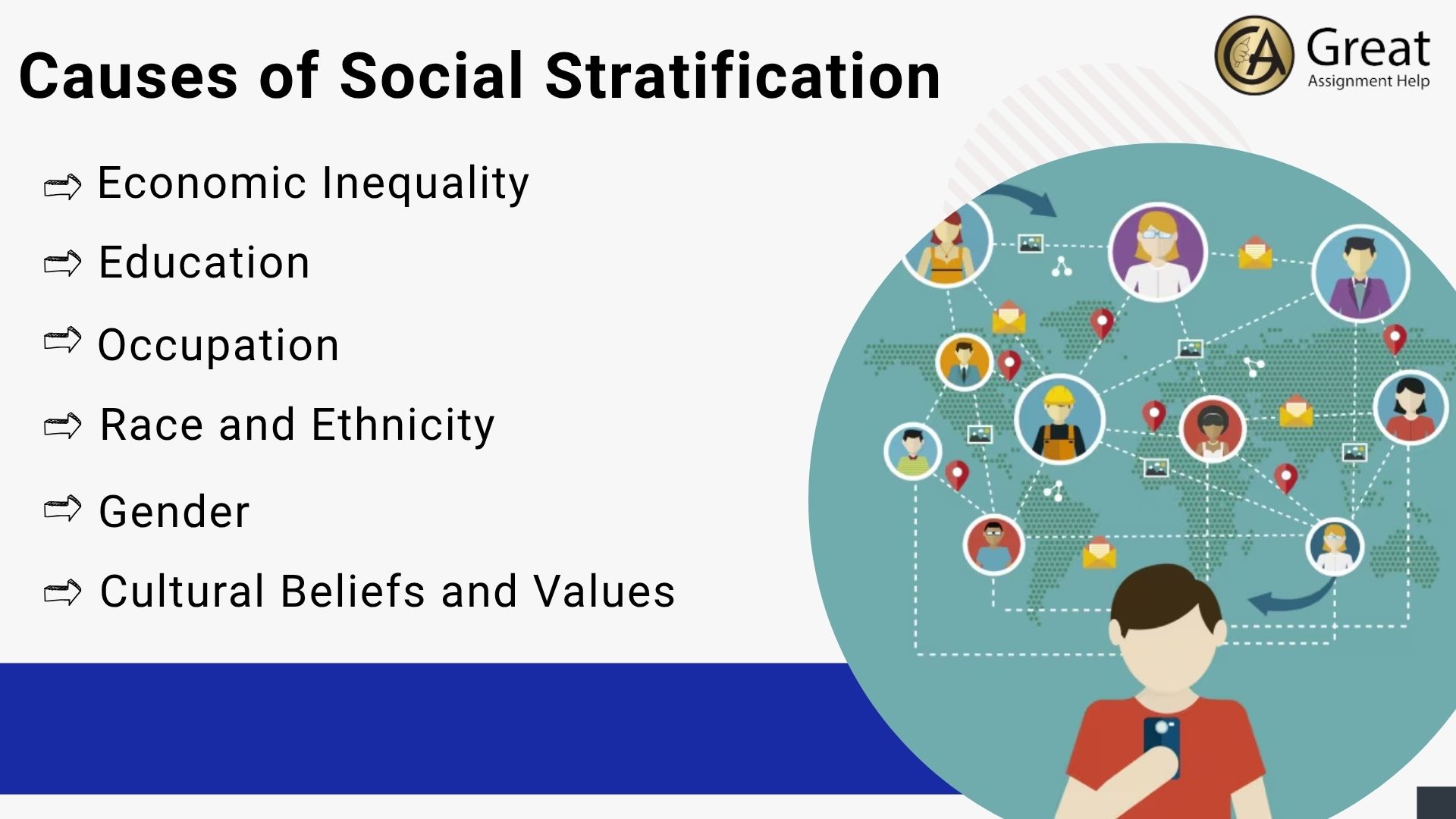Social stratification means dividing people into different levels based on money, job, race, or gender. It will help you understand how society is organized and why some groups have more power. Generally, knowing about social stratification will make it easy for you to explore real-life issues and write your sociology assignments effectively.
Social stratification is a key idea in sociology. It explains how people in a society are ranked in layers based on money, job, race, education, gender, and power. This ranking affects how people live, what resources they can access, and what opportunities they have. As social stratification is an important part of how society works, it affects how students study and write about sociology. Are you are sociology student who wishes to learn about social stratification? If so, read this blog. Here, we have explained what social stratification means, why it happens, the different types, and some real-life examples. Also, in this blog, we have discussed how knowing about social stratification can help students like you handle sociology assignments more effectively.
What is Social Stratification?
Social stratification is a way that societies organize people into different levels or groups. This hierarchy results in structured inequalities, where some groups have more access to resources, rights, and opportunities than others. The idea is that inequality doesn’t just happen by chance. Society plans it and keeps it in place over time.
Stratification is not just about how rich or poor someone is. It mainly includes larger patterns in society that decide who gets more or less, based on factors like class, race, gender, age, or ethnicity.
This kind of ranking exists in almost every society, not just in capitalist countries. No matter whether it is a small tribal group or an industrialized nation, most societies have some form of social hierarchy.
Causes of Social Stratification

To understand why social layers exist, sociologists look at the different reasons that cause them. These are some of the primary causes of social stratification
Economic Inequality
Differences in money and wealth are a main reason for social stratification. People who have more income, property, or valuable things often have a higher place in society. Those who own land or businesses usually have more power and respect.
Education
Education is both a reason for and a result of social stratification. People with more education often get better jobs and a higher status. Those who can’t access good education usually stay in lower social levels.
Occupation
Society values jobs differently. People often see doctors and lawyers as more important than factory workers or service staff, even if they do not earn much more.
Race and Ethnicity
In the past and still today, people face unfair treatment because of their race or ethnicity. Society often treats some groups unfairly and makes it hard for them to improve their social position. This leads to a division.
Gender
Many societies often give men more opportunities than women when it comes to education, jobs, and leadership. This kind of inequality between men and women is common in both traditional and modern societies.
Cultural Beliefs and Values
In many societies, religious or cultural beliefs support social rankings. For example, the caste system in India was backed by religion for a long time, which kept strong social divisions in place.
Types of Social Stratification
Social stratification systems differ based on culture, history, and economy. The main types are:
Caste System
This system is closed, which means a person’s place in society is decided by the family they are born into and doesn’t change throughout their life. It is most common in India, where the caste system divides people into strict groups based on birth. These groups control what jobs people can have, who they can marry, and how they relate to others. Changing from one caste to another is almost impossible.
Class System
Unlike the caste system, the class system is more flexible and lets people move up or down in society. This movement depends on education, income, and jobs. But in real life, moving between classes is often harder than it seems because of different obstacles in society.
Estate System
The estate system was common in feudal Europe. It split society into three main groups such as the nobles, the clergy, and the common people. This system was based on family background and laws, so people could rarely change their social group. The estate system created a lot of inequality between the groups.
Slavery
Slavery ranks people in the lowest social position, treats them like property, and denies them all rights. While most countries have ended slavery, some modern forms like human trafficking and forced labor still exist around the world.
Examples of Social Stratification
In the United States, social classes are clearly seen through the differences in wealth. For example, the richest people own 1% more money than the bottom 90% combined. Even though the “American Dream” says people can move up in society, problems like racial inequality, limited education, and poverty passed down through families make this harder to achieve.
In India, the caste system was officially ended by law, but it still affects how people live. Many from lower castes still face unfair treatment when it comes to jobs, education, and marriage, which keeps social and economic gaps wide.
During apartheid in South Africa, there was a strict racial system where white people had rights and privileges that were denied to the black majority. Although apartheid ended in the 1990s, its effects are still seen today in access to resources, land, and education.
Social Stratification in Sociology Assignments
When you work on sociology assignments, understanding social stratification is more than just learning facts. It is an important way to analyze how society works. In many assignments, instructors often ask you to explore topics such as inequality, race relations, social class changes, and power, all of which relate to social stratification.
Sociology assignments require you to think deeply, especially about questions like how much control you have to change your social class and how institutions keep social divides in place. To do this well, you need a clear understanding of stratification.
Social stratification also connects with subjects like economics, politics, education, and social work. When writing your assignments, you should look at these different areas to fully understand the causes and effects of inequality.
Many students get sociology assignment help not just to finish their work but to better understand tricky topics like stratification. This might include guidance with data, case studies, or comparing theories. Some students might also need Social Work Assignment Help when studying how policies affect social groups. Even if you are not studying social sciences, you might look for Assignment Help when dealing with social issues in fields like business, law, or education.
As social stratification is complex, you need to do more than just remember facts. Specifically, you must analyze how history, culture, and institutions shape people’s lives and society. That is why many sociology assignments involve research, understanding data, and using theories like Marxism, Weber’s ideas, or functionalism to explain these ideas.
Conclusion
Social stratification helps you understand how society is organized and why inequality exists. Studying it encourages you to think critically about issues like class and racism. Generally, understanding stratification will not only improve your academic work but also deepen your awareness of fairness, power, and human behavior. Ultimately, learning about social stratification helps you become a more informed and empathetic person. If you wish to study more about social stratification, get Sociology Assignment Help from the experts in our team. They will teach you all the sociology concepts and help you in improving your subject comprehension, finishing your academic papers effectively, and scoring good grades.



